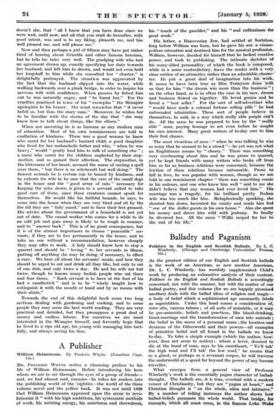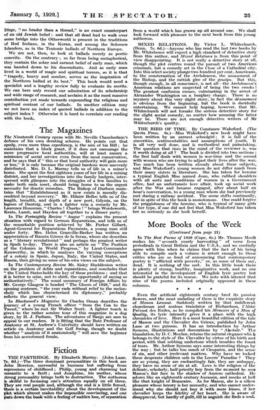Balladry and Paganism
Folklore in the English and Scottish Ballads; 'By L. C.
Wimberly. (Chicago and Cambridge Universities' 25a.) • . • •
As the greatest edition of our English and Scottish ballads is the work of an Ameridan, so now another American; Dr. L. C. Wimberly, has worthily supplemented Child's work by producing an eXhaustive analySis of 'their content. Folklore in - the English and Scottish 13alladi is "aceorcliagly concerned, not with the manner, but with the matter of our ballad poetry, and this volume (for we are hapPily promised another) deals with the ballad ideas of religion and magic--- a body of belief which a sophisticated age summarily labels as superstition. Under this head comes a consideration Of, inter alict, various tabobs ; of all sorts of animistic; or it may be pre-anibaistic, beliefs and practices, Ere blood7drinkingi beast-marriage and the transformation of men into animals the belief in the mana of a personal name ; the location and denizens of the Otherworld and their powers—all examples Of primitiVe belief -and all found in the ballads we knovi to-day. To take a simple example (which the nuthOr,
eVer; dOes not seem to notice) : where a lover, doomed to die at the hand of man, says to his sweetheart, " tak' the high road and I'll tak' the low road," he means that as a ghost, or perhaps as a revenant corpse, he will traverse the underworld at a speed far beyond the power of any human . - _ traveller.
What einerges froth a general view of Professor Wimberly's work is the_ essentially pagan character of ballad- thought. The ballads are, it is true, overlaid with a modern veneer of Christianity, but they. are "-pagan at heart," and Christian thought is " on the whole, alien and intrusive." By 'a number of telling instances the author shows hoW ballad-beliefs. permeate, the whOle world. That bridge, for example, which all must cross, in the famous Lyke Wake
Dirge, " no -brad& than a thread," is an exact counterpart of an old Jewish belief ; and that all dead had to walk over some bridge into the Otherworid is present in the traditions of Red Indians, in the Koran, and among the Solomon Islanders, as in the l'eutonic ballads of Northern Europe.
We are not, then, to look at ballads merely as poetic conceits. On the contrary ; so far from being metaphorical, they contain the sober and earnest belief of early man. which was handed down to . his descendants. And as early man lived in a world of magic and spiritual terrors, so it is that " tragedy, heavy and sombre, serves as the inspiration of the Northern ballad at its best." This book would need a specialist and a lengthy review fully to evaluate its merits. We can here only record our admiration of its scholarship and wide range of research, and acclaim it as the most massive contribution yet made towards expounding the religious and spiritual content of our ballads. In another edition may we not have an index of quoted ballads in addition to the subject index ? Otherwise it is hard to correlate our reading with the book.







































 Previous page
Previous page